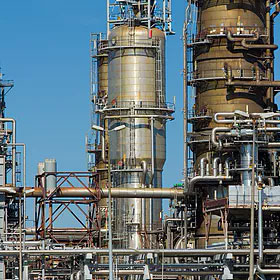Course Details
Your Growth, Our Mission

Course Description
The Training Course Will Highlight ?
The purpose of this course is to provide the attendees with an overview of corrosion concerns in downstream oil & gas industries specific to refinery process units. It aims to identify and examine corrosion and metallurgical failures that may occur in any process and utility units within the refinery. The attendees will have an opportunity to examine techniques and practices that can be used to control corrosion.
Training Objective
The purpose of this course is to provide the attendees with an overview of corrosion concerns in downstream oil & gas industries specific to refinery process units. It aims to identify and examine corrosion and metallurgical failures that may occur in any process and utility units within the refinery. The attendees will have an opportunity to examine techniques and practices that can be used to control corrosion.
Target Audience
Corrosion Control Engineers & Personnel, Process Engineers, Metallurgists, Inspection Personnel, Mechanical Engineers, Material Selection Personnel, Plant Contractors, Operations Engineers, Team Leaders & Supervisors, Maintenance Engineers, Maintenance Supervisors, Senior Plant Supervisors, Mechanical Engineers, Corrosion Control & Monitoring Systems Personnel, Equipment Engineers, Maintenance Engineers and Planners, Team Leaders, Managers & Coordinators, Construction Coordinators, Technologists, Safety Officers, Maintenance Team Leaders & Engineers,Design Engineers, Service Company Representatives, Oil and Gas Production Facilities Personnel, Chemists, Chemical Engineers, Inspectors and Inspection Engineers & Supervisors, Technicians and Supervisors, Environmental Specialists, New Petroleum Engineers, Asset Management Personnel, Construction Engineers, Refinery Chemists, Chemical Engineers, Personnel who are / will be responsible for detecting, inspecting, monitoring, controlling corrosion in oil and gas piping, pipelines used in production operations and Personnel responsible for metallurgy, corrosion or the prevention of failures in plant and equipment
Training Methods
This interactive Training will be highly interactive, with opportunities to advance your opinions and ideas and will include;
- Lectures
- Workshop & Work Presentation
- Case Studies and Practical Exercise
- Videos and General Discussions
Daily Agenda
Course Outline:
-
- Introduction to materials classification
- A basic background on corrosion control techniques
- Low temperature corrosion
- High temperature corrosion and other failure mechanisms specific to oil and gas industries
- Sour service failures mechanisms and interpretation of applicable standards i.e. NACE MR0175/ISO 15156 and NACE MR0103
- Corrosion control concerns on oil, gas and water transmission pipelines
- Materials selection and corrosion aspects
- Forms of corrosion in petrochemical industries
- Fundamentals of corrosion protection in aqueous concerning coating
- Process chemical additives
- Electrochemical method and design
- Corrosion under insulation
- Causes of pipeline corrosion
- Metallurgical influenced corrosion
- Mechanically assisted degradation
- Control of environment variables in cooling water systems
- Amine treating units
- Sulphur recovery units
- Corrosion by chlorine, alkalis, hypochlorite and ammonia
- Corrosion by sulfuric, phosphoric, nitric, HF, hydrochloric and organic acids
- Continuation of acid corrosion
- Materials of construction for downstream applications
- Inspection methods and corrosion monitoring techniques in petrochemical plants
- Failure analysis techniques in downstream oil and gas industries
- Applicable international standards
- Role of materials & corrosion engineer in phases of project
Accreditation
BTS attendance certificate will be issued to all attendees completing minimum of 80% of the total course duration
Quick Enquiry
Request Info
Related Courses
Your Growth, Our Mission

